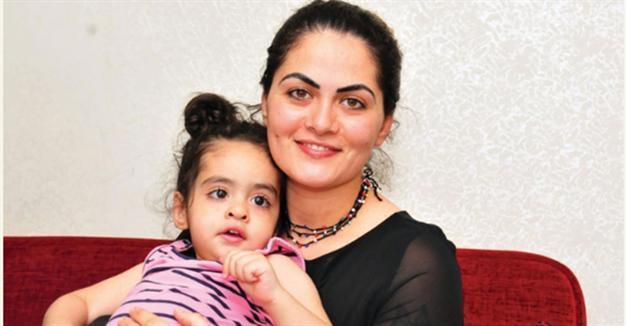‘I would have died if he didn’t,’ says woman who killed abusive husband
Ayşe Arman - ISTANBUL

“I would have died if he didn’t,” said Çilem Doğan, a woman who has become an icon of the women’s movement in Turkey after killing her abusive husband who allegedly forced her into prostitution. Doğan was released on bail on June 20, after a local court controversially denied her self-defense plea and sentenced her to 15 years in jail less than two weeks ago.
“I desperately fired that gun, completely to defend myself. I wouldn’t want him to die, [I wouldn’t want] anybody to die but I would have died if he didn’t,” Doğan, whose release was celebrated by feminists across the country, told daily Hürriyet in an exclusive interview.
“I was enslaved by my emotions. My family objected, but I nonetheless married him, ran to him,” the woman said, describing the beginning of her marriage with Hasan Karabulut – a man who had 19 criminal charges on record and was accused of drug dealing and shooting a police officer.
Doğan said “systematic violence” from Karabulut started on the 28th day of their marriage, leading her to look for an escape by appealing to a lawyer and police officers in addition to the public prosecutor’s office but failing to ensure protection from her husband.
Although protection orders were issued multiple times, they did not work as Karabulut declined to follow the rules and there was no state authority to enforce them.
“He wasn’t supposed to come home but he did, and no one could do anything about it. No one managed to protect me from him,” she said. “He had a criminal record, he was involved in all sorts of dirty things,” Doğan added, saying Karabulut reached a new level when he tried to force her into prostitution.
“If he didn’t die that day, I would have. Because I told the police that he was dealing drugs, I reported him. And he found out,” she said, explaining he came home with a gun, put their daughter in a separate room and locked Doğan inside their bedroom.
“He started hitting me, pulling me by my hair. The gun was under the pillow. I acted early,” she said.
Commenting on her 50,000 Turkish Lira bail, Doğan said her happiness and surprise were beyond words, adding that she felt like defending all other women subjected to violence across the country.
“I feel such responsibility because many women in this country are subjected to violence by men. Our names, social statuses may not be the same but we understand each other perfectly well because, in the end, the pain we feel is the same,” she said.
Doğan’s lawyer, İsa Ayanoğlu, who was also a witness to all periods of the woman’s marriage, provided further details of the abuse and expressed his hopes that the Supreme Court of Appeals would reverse the judgement of the local court in the southern province of Adana.
According to Ayanoğlu, five of six judges in court ruled that Doğan’s case was intentional murder but the chief judge said it was self-defense and included his dissenting opinion.
Based on the chief judge’s dissent, the lawyer filed an appeal to the court and demanded Doğan’s release - which was granted on June 20.
Doğan was exposed to violence following her marriage to Karabulut in 2013. She sought a divorce but gave up in the face of threats from her husband, who said he would kill her family should the divorce take place.
She was detained at her father’s house in Adana and soon confessed to the murder of her husband.
“Will women always die? Let some men die too. I killed him for my honor,” Doğan told police on July 9, 2015.
While walking to the courthouse for a medical exam on the same day, Doğan was photographed wearing a T-shirt reading: “Dear past, thanks for all the lessons. Dear future, I am ready.”
Handcuffed between two police officers, Doğan also gave two “thumbs up” to reporters.
Family objects to bail release of Doğan
The family of the husband of Doğan has objected to a June 20 decision granting the woman’s release on bail.
The lawyers of the family of Doğan’s husband, Hasan Karabulut, filed a five-page objection petition to a higher local court in the southern province of Adana after Doğan was released on a 50,000-Turkish-Lira bail.
In the petition, the lawyers alleged that Doğan’s descriptions of her marriage were incorrect, that she posed a flight risk and that the ruling provided a negative example for social peace and state sovereignty.
Karabulut’s older brother, Mesut Karabulut, said they were following the case closely and were ready to bring it “as far up as President Recep Tayyip Erdoğan,” if necessary.
 “I would have died if he didn’t,” said Çilem Doğan, a woman who has become an icon of the women’s movement in Turkey after killing her abusive husband who allegedly forced her into prostitution. Doğan was released on bail on June 20, after a local court controversially denied her self-defense plea and sentenced her to 15 years in jail less than two weeks ago.
“I would have died if he didn’t,” said Çilem Doğan, a woman who has become an icon of the women’s movement in Turkey after killing her abusive husband who allegedly forced her into prostitution. Doğan was released on bail on June 20, after a local court controversially denied her self-defense plea and sentenced her to 15 years in jail less than two weeks ago.